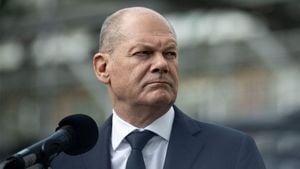U.S. politics are heating up as former President Donald Trump escalates his rhetoric against the BRICS nations—Brazil, Russia, India, China, and South Africa—that are considering creating alternatives to the U.S. dollar. During his campaign, Trump made headlines for his assertiveness, promising to impose hefty tariffs if these nations pursued their plan. With Trump set to take office again in January, concerns are mounting over how this could reshape international trade.
Trump’s comments came via his social media platform, Truth Social, where he declared, "The idea the BRICS countries are trying to move away from the dollar is OVER!" He insisted these countries must not establish their own currency or support any currency initiative aimed at displacing the U.S. dollar. If they ignore this demand, he warned, they would face staggering tariffs up to 100% and should be prepared to lose access to the lucrative U.S. market. Trump provocatively added, "They can go find another ‘sucker!'" This sentiment reflects Trump's usual bold approach to international policy and his characteristic blend of bravado and negotiation tactics.
The BRICS group, which significantly influences global economics, has been considering the establishment of its currency to lessen reliance on the dollar. Historically, the USD has enforced its dominance, accounting for about 90% of global transactions. Withdrawal from this system is not something accommodating; it prompts the U.S. to react with threats, signaling the interconnected nature of global economic strategy.
Within this geopolitical maze, leaders from BRICS nations have had varying viewpoints on the dollar's hegemony. While Russian President Vladimir Putin and Chinese leaders see potential benefits from moving away from the dollar, Indian Prime Minister Narendra Modi has expressed caution, recommending the group to pursue accommodation rather than antagonism with existing power structures.
Trade experts have responded critically to disincentives of such tariff threats. They assert imposing such tariffs would disproportionately harm American consumers rather than hurt the targeted BRICS nations. By raising costs of consumer goods imported from these countries, tariffs can have the opposite effect of what they aim to achieve—reduce dependency on foreign products—thus straining American households who feel repercussions through rising costs.
A significant point of contention arises from choosing to isolate the U.S. from participating economies. Experts, including former trade officer Ajay Srivastava, anticipate potential backfire from such tariffs as they could shift imports to third countries. Importantly, through past sanctions and unilateral moves, the U.S. has inadvertently prompted nations to explore alternatives for trade and finance.
The BRICS nations are no strangers to these challenges. With their recent expansion to include Egypt, Ethiopia, Iran, and the UAE, they now represent nearly half of the world's population and nearly one-quarter of the global economy. This demographic power translates to significant potential for changing trade dynamics and might push the envelope on forming trade systems independent of the dollar.
Reflecting on avenues for cooperation versus confrontation, FIEO Director General Ajay Sahai insists on diplomacy rather than division. He argues for the need to promote local currencies and trade mechanisms balancing BRICS nations' interests without antagonizing the U.S. A wise diplomatic approach might enable these nations to coalesce around their developmental goals without engendering hostility. Yet, the upcoming alterations within the leadership dynamics promise to add layers of complexity to international economic relations.
Trump’s tariff threats aren’t merely political posturing. They also signal broader movements on the world stage toward diversification of currencies and finance. For example, currency composition data from the International Monetary Fund has shown the dollar's share of global reserves slightly receding, which highlights growing interest in alternative currencies like the euro, yuan, and others.
The question arises of whether Trump’s aggressive pricing will truly suffice to keep BRICS at bay or if it could instead ignite financial shifts toward resilient alternative systems. Quick strategic adaptations by these nations toward their national currencies for trade may fill market gaps previously managed through the dollar. For BRICS members contemplating digital currencies and other trade mechanisms, the prospect could represent not merely survival but flourishing resilience against U.S. economic might.
Looking to the future, the potential outcome of such tensions rests on strategic negotiations orchestrated by all players involved—both U.S. and BRICS nations. How these dynamics will play out may define the next chapter of global economic collaboration or contention. Will America’s insistence on its dollar supremacy lead to more isolated dynamics, or will nations find creative solutions to navigate their economic trajectories?
Given the shifting textures of international finance and trade developments, one thing is for sure: the world is watching closely as the BRICS nations, alongside the U.S., find their way through these complex negotiations. Economic forecasts suggest significant changes could be on the horizon, and as always, with change, there are opportunities and challenges alike.



